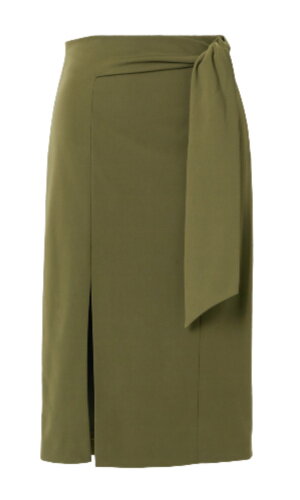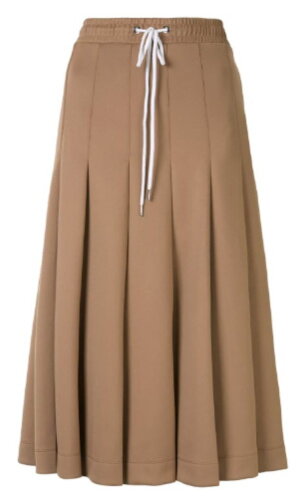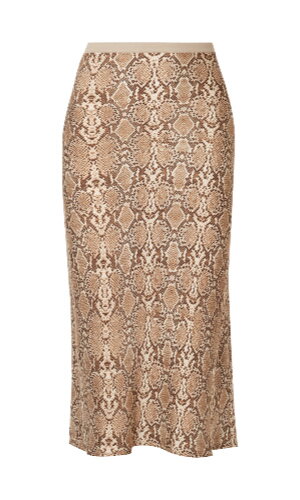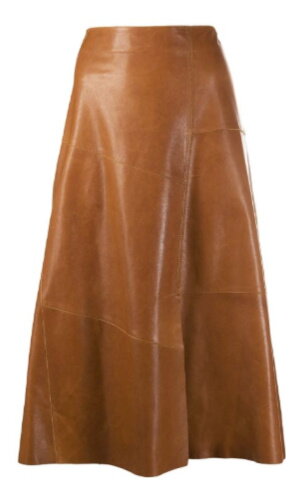Basic Shapes for Sample
The overall shape of a skirt can make or break your apparent height and weight. Here are a few basic ideas to keep in mind: 1.The more a skirt is toward the tapered end of the 'fullness' scale the taller, slimmer and dressier you will appear. 2. The wider and/or fuller a skirt is, the heavier, shorter and you are likely to appear. 3. Evening length skirts should be no wider than a subtle 'A' line for maximum height and slimness. 4. If your skirt is wide, your top should be narrow. 5. If you skirt is narrow, your top can be full/wide. 6. Narrow skirts can be successfully coordinated with narrow tops. 7. Full skirts coordinated with full tops are rarely flattering, even on super models! 8. The style, height and toe shape of the shoe you choose will make a big impact on your overall appearance.Ignore seasonal debates over which lengths are 'in' and go with those that suit the shape of your leg.
~ Your best skirt styles include tapered straight skirts and subtle A-lines.
Skirts with vertical detailing e.g., button front and wrap skirts will elongate your shape.
Select fabrics that drape attractively over your body.
Tone your hosiery in colour to your shoes and skirt and add a focal point above your bustline for the tallest possible appearance.
Avoid stiff or bulky fabrics, hem embellishment and mid calf lengths.
~ As a short woman with a balanced body and good weight your best skirts will be those that are subtly tapered in shape and around knee length.
Vertical detailing such as, a centre front seam or buttons, blending the colour of your hosiery to your hemline and shoes and wearing a focal point above your bustline will all give you the illusion of being a taller.
Select fabrics that are medium-heavy to light-weight.
Avoid stiff, bulky fabrics and hem embellishments.
Very long skirts can at times make you appear even smaller, so opt instead whenever possible for shorter lengths.
- Soft, flowing bias and A-line skirts will be great for giving your body feminine curves.
Basic Shapes
Separates are the most versatile items in any wardrobe and should be purchased in the best quality you can afford, especially when they are in a classic shape and neutral.
Comfort and a great look come from a good fit. Ensure what you wear fits you perfectly. The most critical areas to fit well are the waist and the hips. If too tight, the skirt will be uncomfortable; pull and ride up the body on walking; if too loose, it will sag. To check you have the correct amount of ease in a straight skirt, pinch one side seam. You should be able to ‘pinch an inch or 2.5 cms at the side, and the skirt should be able to be easily twisted full circle while you are wearing it.
There are two main skirt shapes; these are Straight or ‘A-line'. Straight skirts are vertical and add height and slimness to the body, e.g. straight skirt, soft-flowing bias skirts and the knife pleat skirt. ‘A-line' skirts, especially when wide, decrease height and increase apparent weight. They include flounced, tiered and full dirndl skirts.
Long skirts show less leg and decrease apparent height, while short skirts show more leg and make the wearer appear taller and slimmer. For women in business, long flared skirts exhibit less ‘professionalism' than straight knee-length styles. Long straight skirts can get in the way and restrict movement in a busy business environment.
Bandless styles increase torso length and are more comfortable for short-waisted or heavy women through the torso. In addition, wide waistbands can be used to shorten a long torso and lengthen legs visually.
Whenever possible, purchase lined skirts. The lining increases the skirt's life by re-enforcing the back seam and avoiding the challenge of finding the right petticoat/slip.
Your appearance from the back should be important to you. When bending over in a short skirt with a back ‘V'- shaped split, you may find yourself revealing more than you would like others to see. Short straight skirts with a flap or inverted back pleat will be a better choice for modesty and business wear.
Fabric type and drape will determine the fall and ‘attitude' of the skirt. For example, a heavy tweed fabric may look too ‘country' for city wear, while soft floaty florals give off a casual, feminine or even flirty image. Gabardines, wool, and fine woven fabrics and go anywhere, anytime fabrics. Bulky fabrics, checks, plaids and large patterns give off a casual image and can be used to add substance to a thin body. Linens, gabardines and fine wool will decrease apparent weight.
The length of a skirt needs to be flattering and appropriate to the situation.




